Sony WH-1000xM4 vs. Microsoft Surface Headphones 2: Noise-cancelling headphones face-off
Which noise-cancelling headphones are the better model?
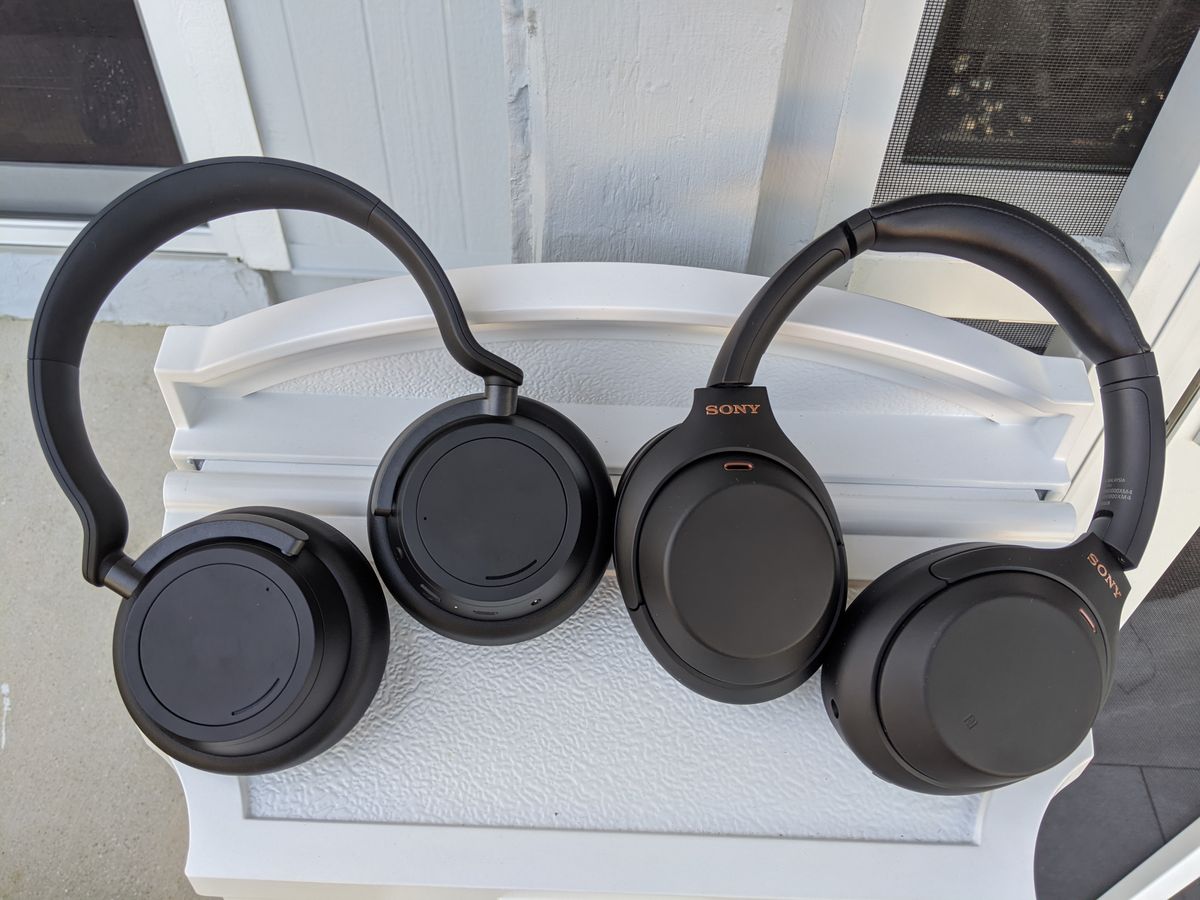
The Bose 700 may be considered the most popular noise-cancelling headphones, but the category isn’t short on incredible options. Models like the Sony WH-1000xM4 and the Microsoft Surface Headphones 2 are elite performers that offer more functionality at a cheaper price.
Laptop Magazine awarded the WH-1000xM4 a 4.5 out of 5 star review and an Editor’s Choice badge for its excellent sound quality, active noise cancellation, and battery life. The Surface Headphones 2 also showed us it could perform at a top-tier level, boasting rich audio, impressive ANC, and some of the coolest controls ever on a pair of wireless headphones. Both models also come equipped with a plethora of features that you won’t find on most other ANC headphones, if any.
- Best noise-cancelling headphones in 2021
- Best Black Friday headphone deals
- Best cheap headphones deals
However, one may suit you better than the other based on your personal needs. Check out our in-depth look comparing the Sony WH-1000xM4 and Microsoft Surface Headphones 2, which breaks down the better noise-cancelling solution.
Sony WH-1000xM4 vs Microsoft Surface Headphones 2: Price
Microsoft undercut the competition straight out of the gate when it released the Surface Headphones 2 at $250. You get more bang for your buck, plus the fact that it launched $100 cheaper than both the original Surface Headphones and WH-1000xM4.
Sony’s headphones don’t come cheap at $350, though bear in mind, you’re paying for top-tier hallmarks. Upon testing, you’ll be convinced that the WH-1000xM4’s level of performance justifies its high price tag.
Chances are slim that we will see both models among this year’s best Black Friday headphones deals, but who knows what Microsoft and Sony have planned heading into the holiday season.
Winner: Microsoft Surface Headphones 2
Stay in the know with Laptop Mag
Get our in-depth reviews, helpful tips, great deals, and the biggest news stories delivered to your inbox.
Sony WH-1000xM4 vs Microsoft Surface Headphones 2: Specs compared
| Header Cell - Column 0 | Sony WH-1000xM4 | Microsoft Surface Headphones 2 |
|---|---|---|
| Price | $349.99 | $249.99 |
| Colors | Black, Silver, Midnight Blue | Light Gray, Matte Black |
| Size and weight | 9.94 x 7.27 x 3.03 inches, 8.95 ounces | 8.03 x 7.68 x 1.89 inches, 10.22 ounces |
| Processor | Sony HD Noise-Canceling Processor QN1 | Unknown |
| Connectivity | Bluetooth 5.0, NFC | Bluetooth 5.0 |
| Companion app | Yes | Yes |
| Special features | Active noise cancellation, adjustable transparency mode, smart controls, tri-digital assistant support, multipoint technology, customizable EQ, NFC, Sony 360 Reality Audio | Adjustable active noise cancellation, transparency mode, customizable EQ, smart controls, digital assistant support, multipoint technology, Microsoft 365 integration |
Sony WH-1000xM4 vs Microsoft Surface Headphones 2: Design
Despite no radical changes being made to these sequels, the WH-1000xM4 and Surface Headphones 2 remain two attractive, luxe-looking models with superb craftsmanship. You’ll draw attention in a positive way, no matter which one you sport, though we favor the Surface Headphones 2 for its more distinctive appearance.
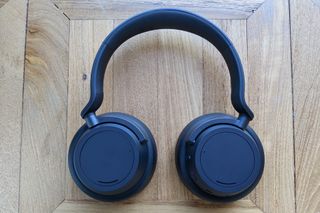
Microsoft’s cans are uniformly constructed, which makes it looks like every component was molded together; not one screw is visible. Durable, soft-touch plastic, plush padding, and sturdy aluminum ensure the product won’t break or damage easily. Each earcup rotates 180 degrees, allowing you to easily store them in the carrying case or prop around your neck. Also, the color options (Light Gray and Matte Black), while similar to what the competition offers, stand out more.
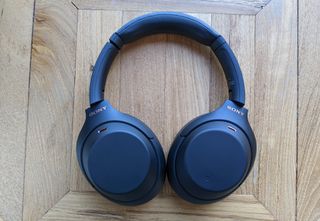
The WH-1000xM4 just screams lavish from the moment you unbox it. Sony’s use of premium materials, along with some fine-tuning to the overall design (e.g. slimmer headband, soft rubberized finish), gives these headphones elegant swagger. They feel premium and sturdy when held in hand. The ear cups swivel and collapse, which makes storing them in the carrying case much more convenient. And though we prefer the Surface Headphones 2’s colorways, we appreciate Sony’s Black and Silver options as well.
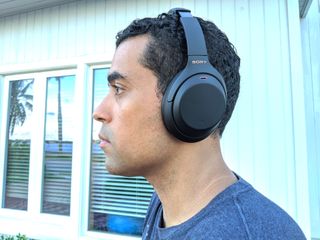
Regarding comfort and fit, we give the edge to Sony, but by a very small margin. The WH-1000xM4 has been scaled down, both in size and weight, to rest gently on the skull and deliver lower clamp force. I found the earpad and headband cushioning to be supportive, while the wider cutouts increased ventilation to prevent moisture buildup.
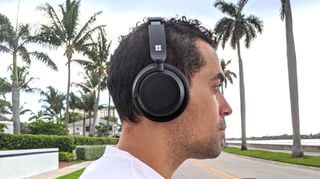
The Surface Headphones 2 are larger and heavier than the WH-1000xM4, but still make for a pleasant fit that you can wear for a few hours before fatigue sets in. The earpads have great cushioning and the large, circular cutouts are perfect for those with bigger ears.
Winner: Microsoft Surface Headphones 2
Sony WH-1000xM4 vs. Microsoft Surface Headphones 2: Controls
Microsoft wins this round on innovation alone. The dials on both ear cups are such an understated feature that allows for seamless control over volume and noise cancellation. Touch controls remain on point, with the touch panels being responsive to single and multi-tap gestures, as well as highly versatile with input. You can actually perform swipes to execute the same commands, which we discovered works best for playback, be it play/pause (one swipe) or skipping tracks (two quick swipes).
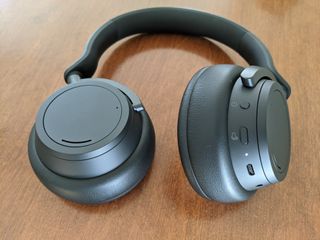
The WH-1000xM4 has its own creative set of controls that make operating the headphones a breeze. Sony’s touch panels register tap gestures accurately and perform intended commands without any latency. The panels also register swipes, though this action performs slightly better on the Surface Headphones 2.
On the flip side, we found Sony’s automated controls to be superior. On-ear detection works flawlessly to automatically pause music when removing the headphones, which Quick Attention does too when placing your hand over the right earcup. Speak-to-chat is the most promising of the batch, using the headphones’ mics and advanced signal processing to pick up your voice and stop music, resuming it once you tap the touch panel.
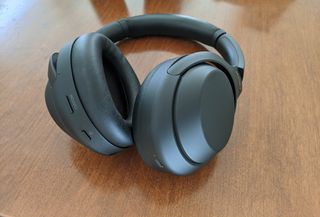
Now, let’s discuss digital assistant support. You can’t go wrong with either set of headphones. Sony’s “Precise Voice Pickup” technology does an amazing job with speech recognition, allowing Siri, Google Assistant, and Alexa to hear voice commands clearly and respond immediately. Even though the Surface Headphones 2 only supports Apple and Google’s AI bots, and ditches Cortana, it picks up every syllable and dishes out results as quick as it receives them.
But, again, it all comes down to the dials. Those awesome, smooth-controlling dials.
Winner: Microsoft Surface Headphones 2
Sony WH-1000xM4 vs. Microsoft Surface Headphones 2: Active noise cancellation
The only company right now that comes close to matching Bose’s active noise cancelling technology is Sony. Therefore, you shouldn’t expect any surprises in this round. The WH-1000xM4 offers a better noise-cancelling experience, though I wouldn’t sleep on the Surface Headphones 2.
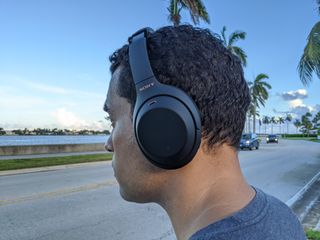
Sony’s two feedforward mics, proprietary Dual Noise Sensor technology, and HD Noise Canceling Processor QN1 chip are the triple threat that grants the WH-1000xM4 such incredible ANC performance. The headphones block out close to 90% of ambient sounds across the frequency spectrum, from crying babies to home office machinery (e.g. printers, faxes) to vehicle engines. It requires several of these distractions to take place at once in order to be pulled away from whatever you’re listening to.
One advantage the Surface Headphones 2 has over the WH-1000xM4 is its 13 adjustable ANC levels, which is actually higher than what the Bose 700 (10 levels) offers. You can easily cycle through them using the dial controls. Honestly, you won’t notice much of a difference between levels 5 and 10, though you’ll get the best results when set to max level. Microsoft’s noise neutralization is powerful enough to block out common background noises like chatty neighbors and whisking cars. High-frequency sounds, not so much. The occasional car horn or doorbell is audible and sounds louder than expected.
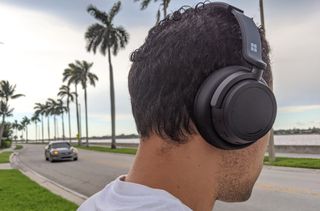
Both models also come with their own Transparency Mode to hear and analyze your surroundings for better awareness. Sony’s version is more advanced with 20 levels of ambient sound that you’ll be able to hear more distinctively. I had short conversations with my wife and could hear the dishwasher timer from another room without ever removing the headphones. Microsoft’s didn’t do so well because of the same two issues that plagued the original: background hissing and the echoing effect whenever someone speaks.
Winner: Sony WH-1000xM4
Sony WH-1000xM4 vs. Microsoft Surface Headphones 2: Audio Quality
If you thought Microsoft had an uphill battle challenging Sony’s noise cancellation, consider its challenge in sound quality almost insurmountable. The WH-1000xM4 is without a doubt the best-sounding pair of headphones in the category, boasting a boom-filled, detailed soundstage that lends itself well to every music genre and multiple media formats (e.g. movies, video games, podcasts).
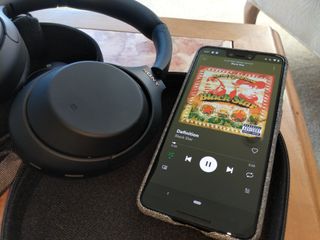
Bass is bountiful and well balanced on Sony’s headphones, which is exemplary when indulging in hip-hop and rock songs. The drum and bass rhythm on Black Star’s “Definition” sent a rush of adrenaline through my ear canals that stimulated incessant head-nodding. You would think the rap duo’s vocals take a hit, but it’s the complete opposite. Mos Def and Talib Kweli’s rhymes were crisp, showing that the WH-1000xM4 places as much emphasis on mids and highs as it does lows.
Taking bass up a notch, I proceeded to blast Chee’s “Vultures” and was met with shockingly great results. The progressive thunderous production remained steady and the heavy growl-synths were reproduced to perfection, leaving no distortion on the soundscape.
Sony engineering these headphones to support multiple codecs (LDAC, AAC, SBC), along with DSEE Extreme and Edge-AI technologies, makes all the world of difference. Not only is fidelity enhanced on digitally compressed files, but you should also notice a boost in clarity on low-fi recordings and ripped MP3s.
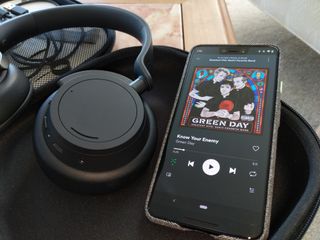
While not as sonically adept as its adversary, the Surface Headphones 2 should not be underestimated on the audio end. Microsoft’s 40mm Free Edge drivers produce energetic and spacious sound to enjoy most music tracks. However, like the original Surface Headphones, the bass levels can get a bit overzealous at times and create minor fuzz. As much as loved the impact from the driving bass drums and electric guitar bridge on Green Day’s “Know Your Enemy,” the unflattering synth reproduction and masked vocals on Kanye West’s “See You In My Nightmares” didn’t thrill me.
Winner: Sony WH-1000xM4
Sony WH-1000xM4 vs. Microsoft Surface Headphones 2: App and special features
These are two of the most feature-laden headphones out there, each of which rewards you with cool sound customization and productivity tools. While we find the WH-1000xM4 has more enticing options to play with, your decision could sway in the Surface Headphones 2’s direction if you’re an avid Windows user.
Let’s start with the hub for all WH-1000xM4 features: the Sony Connect Headphones app. Here is where you’ll find the features that enhance sound quality on multiple levels. It all starts with the built-in Equalizer, which allows you to make your own sound profile by manually adjusting the frequency levels or select from one of several well-engineered presets: Bass Boost, Bright, Excited, Mellow, Relaxed, Treble Boost, Speech, and Vocal.
You can enable Digital Sound Enhancement Engine (DSEE) Extreme to upscale compressed digital music files in real-time. Then there is Sony’s 360 Reality Audio platform, which is compatible with a few hi-res services (e.g. Amazon Music, Tidal, Deezer) and uses spatial audio technology to create a 360-degree soundscape.
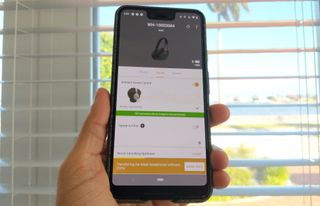
Sony’s app also lets you experiment with some of the more advanced listening modes. You can enable NC Optimizer to measure your ears and create the best listening environment possible based on your head size. Atmospheric Pressure Optimization will adjust the pressure depending on the altitude. A number of toggle controls are accessible as well, including automatic power off, firmware updates, motion detection, and custom button customization.
The Surface Audio app doesn’t skimp on features either, with Microsoft 365 integration being the headliner. This opens the door to use voice dictation on the Surface Headphones 2 with several Windows programs (e.g. Word, Outlook). Voice dictation is surprisingly good for the most part, though errors are to be expected when using dictation software. The Live Caption feature is clutch as well and can perform real-time translations in over 60 languages. You can also set the headphones to read your Outlook messages via a Play My Emails feature.
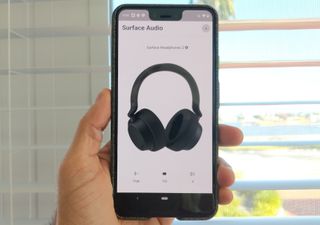
If you’re wondering whether the Surface Headphones 2 has its own adjustable EQ, the answer is yes. You can either tweak and save your own sound profiles or select from five sound presets (Flat, Classical, Jazz, Pop, Rock) already programmed. Half of them work well, but you’ll be inclined to stick with the default preset. That’s really it, as Microsoft forgot to include two popular features that were available on the previous model: Spotify integration and the ability to create lists that the headphones can read back to you.
Winner: Sony WH-1000xM4
Sony WH-1000xM4 vs. Microsoft Surface Headphones 2: Battery life
This is a no-contest. Sony wins. The WH-1000xM4 has some of the highest-rated battery life in the category: 30 hours (ANC on), which is about 10 to 12 hours more than what Microsoft’s headphones offer. A full charge is sufficient for a month’s worth of playtime when using the cans in moderation. That’s also enough for an international round trip. Quick-charging is powerful too, generating up to 5 hours of use on a 10-minute charge.
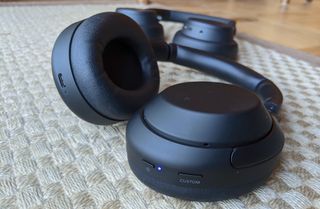
Microsoft did increase the battery life on the latest model, from 15 to 20 hours, though the Surface Headphones 2 fails to hit its advertised mark. ANC, high volume, and productivity features drain the battery quickly; I noticed battery levels dropped 30% after 2 hours of Spotify streaming and having ANC on. This is fine for about a week’s worth of listening, but there are noise-cancelling headphones like the $80 Anker Soundcore Life Q30, that hold double the battery life for way cheaper. One positive is that the Surface Headphones 2 get you an hour of playtime on a 5-minute charge.
Winner: Sony WH-1000xM4
Sony WH-1000xM4 vs. Microsoft Surface Headphones 2: Call quality and connectivity
The Surface Headphones 2 are the more preferable model whenever jumping on phone calls or Zoom chats. Microsoft’s noise-cancelling mics manage to block out a large amount of background noise, which is perfect for when you want to do video chats outside. My wife was surprised by how clear I sounded in the backyard and never once heard the construction work taking place next door. You can also take calls in wired mode via an aux cable, though this will enable the mic on the cable, which isn’t that good.
The call quality on Sony’s cans has improved, but not by much. When using the WH-100xM4 indoors, a few clients mentioned how loud I sounded, though my vocals weren’t crisp. The results were muffled when stepping outside. Much like the WH-1000xM3, this version struggles with wind resistance.

Both models support Bluetooth 5.0 and come with their own unique wireless features. The WH-1000xM4 has an NFC chip built into the right ear cup, which you can lay on the back of any compatible Android device to automatically pair the headphones, along with multipoint technology to connect to two devices simultaneously. As cool as those features sound, the Surface Headphones 2 proves to be the stronger wireless beast, connecting up to 10 devices at the same time. We also like that the headphones will inform you which device you’re using at the moment.
Winner: Microsoft Surface Headphones 2
Sony WH-1000xM4 vs. Microsoft Surface Headphones 2: Winner
The Sony WH-1000xM4 is a ridiculously tough competitor that only one model can beat, and that model isn’t the one with the Windows logo brandished on the headband. Sony’s latest creation is the upgrade we anticipated, introducing new hardware and features that elevate its performance to the next level.
The several audio technologies programmed into these cans are exceptional, resulting in a loud, dynamic soundstage that can also be personalized via a companion app. Noise cancellation is excellent. And having 30 hours of playtime with ANC on at your disposal is simply music to our ears.
| Header Cell - Column 0 | Sony WH-1000xM4 | Microsoft Surface Headphones 2 |
|---|---|---|
| Value (5) | 4 | 5 |
| Design (15) | 12 | 13 |
| Controls (10) | 7 | 8 |
| Active noise cancellation (20) | 19 | 17 |
| Audio quality (15) | 15 | 12 |
| App and special features (15) | 14 | 12 |
| Battery Life (10) | 9 | 7 |
| Call quality and connectivity (10) | 7 | 8 |
| Total Score (100) | 87 | 82 |
Don’t get us wrong now. The Microsoft Surface Headphones 2 does prove that the second time can be a charm. With better noise cancellation, longer playtimes, and some of the best productivity features available, there is much to enjoy from these next-gen cans. Though, ideally, they serve better as work-from-home headphones than for casual listening or travel, thanks to their wonderful Microsoft 365 integration, and, unfortunately, their low battery life.
But listen, $250 for the Surface Headphones 2 is still a sweet deal when factoring in the amount of functionality they provide. Just know that if you want the better performing noise-canceller, it is the WH-1000xM4.
